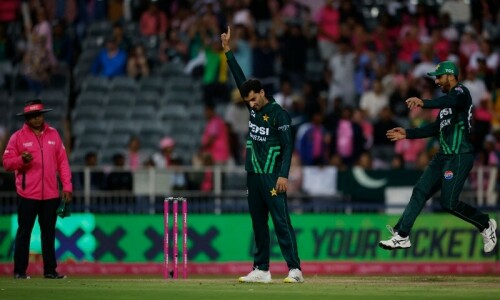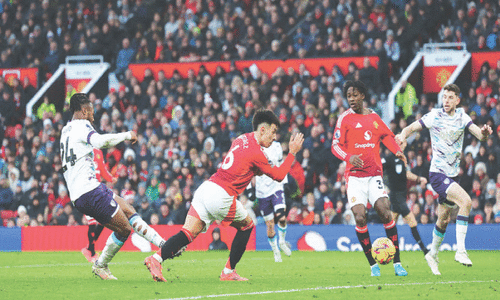
The match and spot-fixing controversy continues to rage on despite the best efforts of people who seem to be seriously involved in eradicating the menace.
The unwarranted and unwise statement issued recently by James Sutherland, the Cricket Australia CEO, alleging that last summer’s spot-fixing scandal in England had come as a result of PCB’s failure in implementing Justice Qayyum’s judicial enquiry report, has not helped either.
It has in fact added fuel to the fire which obviously has irked the PCB officials, and justifiably so. They have now very rightly lodged a protest with the ICC through a letter, asking the world body to look into this serious allegation.
Sutherland, if he had done his homework properly and had bothered to look into his own backyard and all the records in his office cabinet, he wouldn’t have dared to open his mouth accusing PCB for their lack of effort in the matter.
He should have known that it was not Pakistan but the Australian Cricket Board (ACB) — now Cricket Australia (CA) — which had been responsible for the biggest cover-up on match and spot-fixing saga of the last two decades. The ACB shielded their stars Mark Waugh and Shane Warne after they were found out to be involved with Indian bookies, passing on to them information about pitch, weather and more in return of substantial payment during Singer World Series tournament in Sri Lanka in which India, Sri Lanka, Pakistan and Australia participated in 1994.
Having read what Sutherland had to say, I thought it is no longer correct to keep quite and I should let the readers know the gory details of the big Australian cover-up and to let Sutherland know that when you disturb a hornet’s nest, you should expect to be swamped by the stinging wasps and could end up with a swollen face.
Being a roving reporter for prestigious organisations such as the BBC, The Guardian, The Times, The Daily Telegraph, Reuters and AFP, I had my own moles and sources to get to the root of the story and I knew all along about Mark Waugh and Warne’s involvement with the bookies — from 1994 onwards — and the punishment that was handed to them secretly by the ACB.
But it was not me but my two Australian journalist friends, Mark Ray of Sunday Age and Malcolm Conn of The Australian, both most knowledgeable men in their profession who came into action that things really came into the open.
The chronology of the cover-up, in fact, started when Mark Waugh was met up with an Indian bookmaker John during the Singer World Series in Sri Lanka who enticed him with money to provide team, pitch and weather information in return of US$4,000.
Waugh, at the Oberoi hotel in Colombo, then introduced Warne to him as well who too got into the net, having lost huge sum of money in the nearby Casino.
The two kept their deal with the bookie secret from their colleagues, fearing disapproval from them. They even kept silent during the subsequent tour of Pakistan in 1994-95 after they reported Pakistan captain Salim Malik attempting to bribe them to play poorly in Tests.Phil Wilkins, a respected Australian cricket writer ofSydney Morning Herald, however got the sniff of Malik’s wheeling-dealing attempt and as a result media interest began to build up, although at a slow pace.
An anonymous letter to Mark Ray of Sunday Age alleging Waugh and Warne being paid by the bookies, then triggered an investigation into the shady affair, launched by then Australian team manager Ian McDonald. It resulted into signed statements from both the Aussie players on Feb 20, 1995 acknowledging their involvement with the bookies.
The statements were then passed on to Graham Halbish, the CEO of ACB, who called both Waugh and Warne at the team’s hotel before their departure for the West Indies tour. The players admitted their guilt in front of ACB Chairman Alan Crompton and were fined A$8,000 and A$10,000 respectively.
The matter was secretly passed on to Sir Clyde Walcott, the first non-white President of the ICC, and his deputy David Richards — the CEO.
The committee members of the ACB were bemused that the information was passed on to the ICC without their consent.
Everything till then was kept under wraps by the ACB officials including the fines imposed on the two players and their involvement, not a whiff even to the press about what had gone on within the ACB or that the players have been punished.
Crompton and Halbish, the Chairman and CEO of ACB respectively, feared that if the involvement of players was revealed, the credibility of the two players as witnesses against Pakistan captain Salim Malik would be severely in question now that the two had themselves been found guily of involvement in activities associated with unregistered gambling.
Furthermore, it was feared that the pressure on the ACB to ban the two players will escalate. So they finally decided to cover the matter up.
Furious Australian mediamen, chastened with what had been going on within the ACB and about the cover-up, then threatened the board officials to reveal the scam.
It was Malcolm Conn who did it, threatening the then ACB CEO Malcolm Speed that he is going to run a story about Waugh’s involvement with the bookies, not knowing himself that even Warne was fined.
Speed, realising the consequences, pre-empted Conn by releasing a statement that two unnamed players were fined in 1994-95 for having financial dealing with bookies.
The next day Conn’s story ran on front page of The Australian about the great Australian Cricket cover-up, with a bold headline saying ‘Cricket’s betting Scandal’. Subsequently, Mark Waugh was booed all the way to the crease the next day in the Test against England at the Adelaide Oval.
Both Waugh and Warne, through their manager, then hurriedly called a media conference in which they admitted of being ‘naive and stupid’.
In the knowledge of what had gone on within the ACB, I would for my part — from 1994/94 onwards — in every annual press briefing of the ICC at Lord’s ask the president and the CEO David Richards as to why the ICC is not taking any positive action to stop allegations of dicey dealings against Pakistan captain Malik by the Aussies. Every British journalist would vouch for that.
In return, I would get sketchy response, with Richards — also being a former ACB CEO — telling me that it was not in the ICC’s jurisdiction to take action because of the matter’s legal implications.
And mind you, that response by Richards was given to us despite him being in the knowledge of what had gone on in the ACB offices. It was a cover up at all levels involving ACB.
Had the Australians running the game been honest back then in 1994-94, there would not have been any need of Justice Qayyum, Justice Bhandari and Justice Late Chandrachaud of India investigating into match and spot-fixing and the game may not have been as much plagued with the menace as we experience in every day of our life now.














































